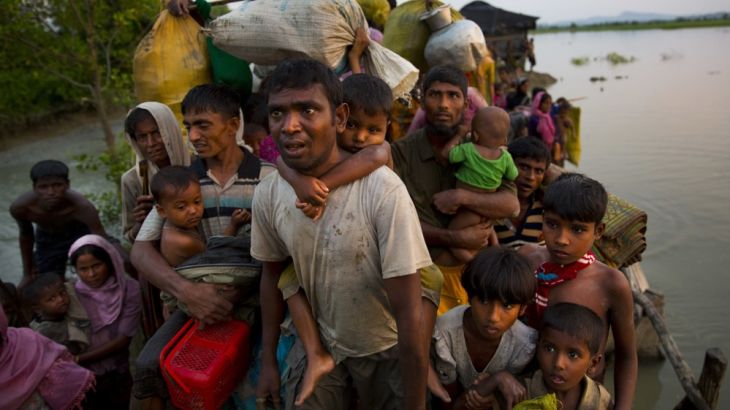
Myanmar’s ARSA: Freedom fighters or ‘terrorists’?
Al Jazeera speaks with a Rohingya fighter about the discrimination and persecution that made him turn to violence.
Until recently, the Arakan Rohingya Salvation Army (ARSA) was little known beyond the borders of Myanmar.
The armed group fighting Myanmar’s security forces in Rakhine state wants an end to decades of persecution of the country’s Rohingya minority.
On August 25, 2017, they launched simultaneous attacks on police stations and border outposts, killing dozens of people.
The police and military use various way to suppress us. They beat, torture and humiliate us. That is why we decided to stand up.
The Myanmar security forces had not previously been challenged in such a violent way and responded with an unprecedented crackdown.
Since then, Rohingya have kept coming across the border into Bangladesh, fleeing what the UN describes as an ethnic cleansing.
At least 800,000 people have so far sought refuge in Bangladesh.
They tell stories of atrocities committed by Myanmar’s security forces. There are reports of women and girls as young as 10 being gang raped. Others have described horrific scenes of babies being snatched from the arms of their parents and thrown into fires.
The crackdown continues and a humanitarian catastrophe is unfolding in Bangladesh as a result.
Nicolas Haque speaks with a member of ARSA who participated in the August attacks.
“We attacked them because they refuse to give us our basic rights as citizens,” Mohammed* says.
“Again and again, [the] Myanmar government lies to the world. They say they treat us well and give us rights but they don’t. We are unable to travel from one place to another. We are not allowed to run a business. We are not allowed to go to university.
“The police and military use various way to suppress us. They beat, torture and humiliate us. That is why we decided to stand up.”
Many Rohingya have lost faith in Aung San Suu Kyi, Myanmar’s state counsellor.
In 2013, when asked about persecution of Rohingya in her country, she told Al Jazeera, “I am not happy about the fact that there should be such tension in our country and also I’m unhappy about the fact that there’s so much focus on these troubles that it is difficult for us to resolve them calmly.”
“I would like to help them of course. I would like to help achieve a situation in Burma of which we can be proud,” Aung San Suu Kyi said.
Mohammed is among those disappointed in his country’s leader.
“We did support her and thought she would give us the rights we deserve. Some of us continue to believe in her. But many are disappointed. She has broken promises she made. She can still change the situation. She has that power,” he says.
How far will ARSA’s fighters go in their campaign to end discrimination and persecution?
“Many of our men are running out of strength, but we remain determined to do whatever we can with whatever we have to defend ourselves,” Mohammed says.
* Not his real name